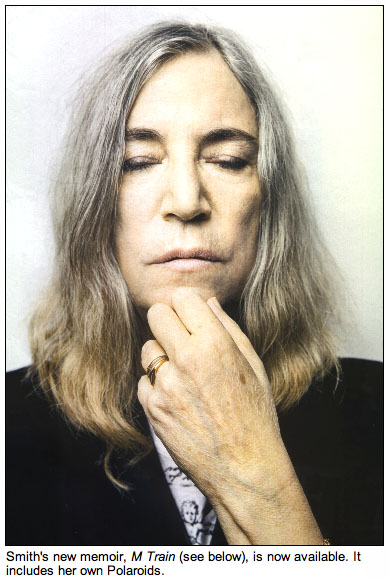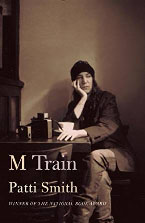![]()
| What I've Learned by Patti Smith |
|
![]()
The 70-year-old musician, writer and artist is interviewed
in New York City on September 2, 2015.
Interviewed by Cal Fussman in Esquire

![]() look at each experience talking to someone as a whole new world.
look at each experience talking to someone as a whole new world.
We were a lower-middle-class family, and every time we bemoaned our fate, my mother would say, "I wept because I've no shoes, and then I saw a man who had no feet." That was my mother's mantra, and it's a good one.
My father was a beautiful man. When I was a kid, his whole preoccupation was the search for the meaning of life. If a fireman came to the door, he'd invite him in and immediately engage him in some kind of philosophical discussion. Why are we here? Who put us here? What is our purpose?
So I had a very down-to-earth, compassionate mother and head-in-the-clouds, searching father. It was like being raised by the earth and sky.
A lot of people think I'm going to be like a punk rocker and just tell them to go fuck themselves. I'm not like that at all. When I was young, I could be very confrontational. But that was maybe forty years ago. So I've already done that.
When you're going up a hill on an Icelandic pony and you're about to jump over a little stream, you must completely believe in the horse and fate. Because if you show fear, you'll spook the horse and the horse my stumble. It's not being reckless. It's being unfettered by doubt. That's my definition of trust.
I like my mind, and I feared harming it. I saw some of the best minds of my generation, and some a little older than me, destroy themselves in front of my eyes. That's what kept me from the drugs and other excesses in the seventies. I said no not because I lacked courage; it's because I was self-protective. Fear can be useful.
I had a taste of fame in the late seventies through rock 'n' roll. It started in Europe, not so much in America. In Florence, we had eighty thousand people come to see us in a soccer arena with no opening band. I had girls chasing me up the street, trying to cut my hair, and there were people offering themselves to me. It was kind of fun. Interesting. But it didn't contribute to any evolution. Not to my work of to my evolution as a human being, and I became very conscious of that very quickly. Very quickly.
If you walk the streets alone and you look afraid... you'll draw people to you. Those are the people who get mugged or robbed. Nothing ever happened to me. I was open, but I wasn't afraid.
Milk cost, say, eight cents. Chocolate milk cost ten cents. Robert [Mapplethorpe, the artist and Smith's longtime companion] loved chocolate milk. We didn't have the extra two cents to buy him the chocolate milk, or if we did it would mean I couldn't get my coffee. So it was always a trade-off. We got to a point where it was either a sharpener and three pencils or a grilled-cheese sandwich we could split. Finally, I would just lift the pencils so we could eat.
Friends isn't even a good enough word.
I wrote Just Kids for Robert. I said to him, "Is there anything I can do?" We both knew he was dying. He gave me some tasks he wanted me to do, and then he said, "Will you write our story?" And I shuddered, you know, and said, "Do you really want me to?" And he said, "Yes." And I said, "Well, then I will write it." He knew I would. And he died the next day. It was quite a task, and sometimes, truthfully, I didn't feel up to it and I would shelve it. It took me twenty years to find the courage, the voice, and the energy.
I always doubted -- Am I really an artist? Robert had no doubt. He had no doubt that he was an artist, and he wanted me also to have no doubt.
All the people I've lost -- and I've lost a lot -- I keep them with me. And it makes life that much happier. About six or seven years ago, I saw the perfect shirt for Fred, my late husband. I started paying for it before I even realized what I was doing. And then I bought it anyway. I just keep them all with me because life doesn't have to be so lonely. You know, if you shut everybody out just because they die, then what's it all for?
I'm sort of on Life Four. Until I was twenty, there was my life with my family. In the seventies, it was my life with Robert but also Sam Shepard and the band. It was all the tings that happened in New York. The next decade and a half was with my husband. And between '94 and 2004, I was raising my children, still going through whatever, grieving. And now my children are grown. In the last ten years, I'm a bum. I'm a happy tramp, just going where I like, on my own. I have no companion, sort of free. The difference is I usually have money in my pocket to eat. I don't have to go scarfing around for sixty-five cents for a sandwich.
Sometimes curiosity is akin to excitement. Sometimes it's just having an investigative mind.
Maybe curiosity killed the cat, but the lack of curiosity will kill us. ![]()
| Midnight Train |
|
![]()
Patti Smith follows up her surprise best-seller 'Just Kids'
with a somber, bittersweet "roadmap" through her life.
by Leah Greenblatt in Entertainment Weekly
Patti Smith
M Train
MEMOIR


![]() mong a certain set of music lovers and misfits, Patti Smith has been a star for more than four decades, a patron saint to punk-rock kids and aspiring poets who scrawl her song lyrics in book margins and tape moody black-and-white photos of her to their bedroom mirrors. But for many people she was a vague public figure at best -- stacked in old record bins, name-checked by Madonna and Johnny Depp -- until 2010's Just Kids, the left-field phenomenon that spent weeks on best-seller lists and went on to win a National Book Award. A mesmerizing portal into a vanished New York demimonde of beatniks, freaks, and downtown art stars, Kids was also a love story at its heart, a tender tribute to Smith's best friend and creative soul mate, Robert Mapplethorpe, the famed photographer felled by AIDS at 42.
mong a certain set of music lovers and misfits, Patti Smith has been a star for more than four decades, a patron saint to punk-rock kids and aspiring poets who scrawl her song lyrics in book margins and tape moody black-and-white photos of her to their bedroom mirrors. But for many people she was a vague public figure at best -- stacked in old record bins, name-checked by Madonna and Johnny Depp -- until 2010's Just Kids, the left-field phenomenon that spent weeks on best-seller lists and went on to win a National Book Award. A mesmerizing portal into a vanished New York demimonde of beatniks, freaks, and downtown art stars, Kids was also a love story at its heart, a tender tribute to Smith's best friend and creative soul mate, Robert Mapplethorpe, the famed photographer felled by AIDS at 42.
Another monumental loss runs through M Train: her husband, Fred "Sonic" Smith, only three years older than Mapplethorpe when he died. Here the writing style is much more spare and elliptical -- part dream diary, part travelogue, and shot through with sobering reflections on age and impermanence. The book's brief chapters are anchored mostly in the near-present, and their twilit tone feels far removed from Kids' giddy sense of discovery. Still, Smith's passion for certain things is undiminished: good books, strong coffee, a poem or a painting or a beautiful piece of music she can get lost in. A lover of talismans and lifelong student of liberal arts, she'll travel thousands of miles just to take a Polaroid of Frida Kahlo's crutches in Mexico City or lay a matchbox full of pebbles at Jean Genet's Moroccan grave. But she's not a culture snob; TV detectives enthrall her nearly as much as French philosophers and depressive Russian novelists (Fair warning: If you don't know how season 3 of The Killing ends, skip page 238).
Some fans of Just Kids will inevitably be disappointed by M Train's pensive wanderings and muted palette. Patient ones, though, will find a different kind of beauty: bittersweet and battered by time and circumstance, but still somehow full of grace. B+ ![]()
![]() Reader's Comments
Reader's Comments
No comments so far, be the first to comment.
